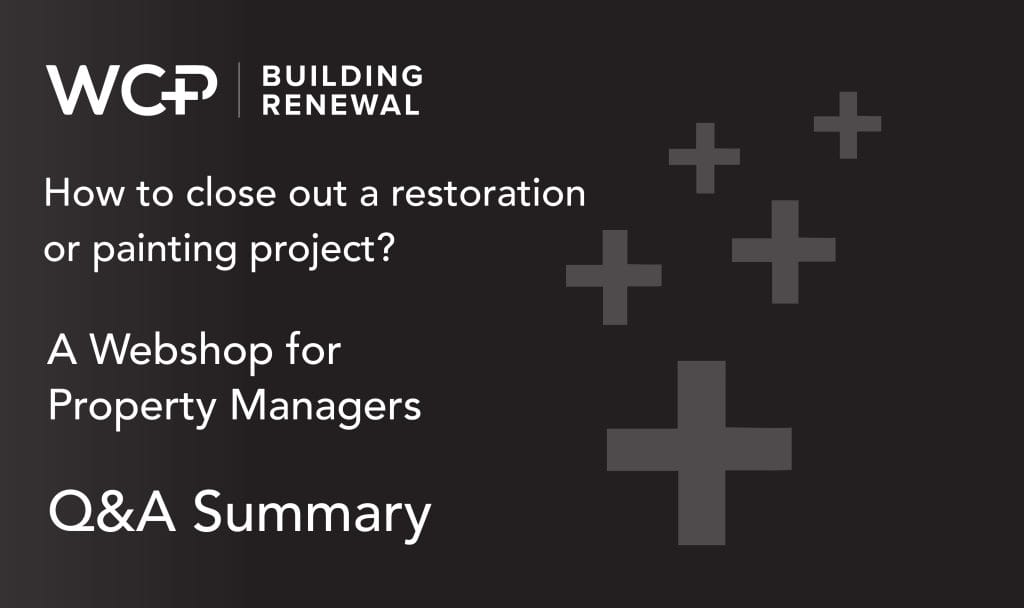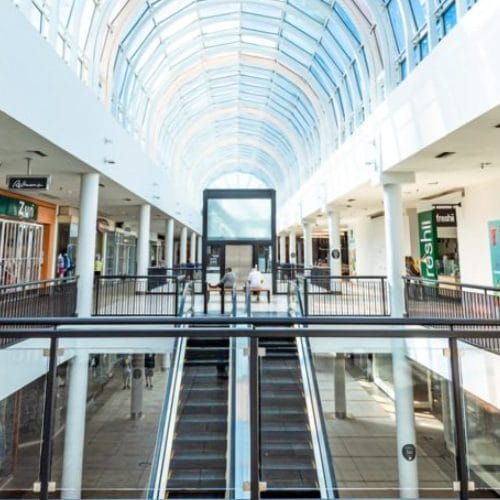We received a number of questions from our latest webshop: How to close out a restoration or painting project? Property managers and building owners from across Vancouver attended and were eager to learn and share best practices. These forums are great opportunities for industry stakeholders to gather, add a few “tools to the belt” and hear how peers are overcoming familiar challenges when it comes to working with building operations and painting and getting projects across the finish line efficiently, on time, on scope, and budget.
Many of the questions were directly related to our topic, but once the crowd got going, many questions flowed related to all aspects of working with contractors. Here are some of the questions we received and our answers:

For what project size should I bring in a third party, like a consultant or Engineer?
For larger projects over $250,000, or highly technical or complex projects such as building envelope restorations, the engagement of a specialist or consultant is recommended. These professionals will develop your scope of work and specification, tender the project, and in some cases, oversee the work. For other services, you will typically pay 5% – 10% of project value.
Keep in mind that your painting and building restoration contractors are also industry experts. So if you are with trusted contractors who have provided exceptional service and quality on previous projects, you may want to consider saving the costs of hiring a third party. A professional contractor will explain their scope and specification in detail and oversee every aspect of the project from start to finish.
When should I ask for a statutory declaration?
For larger projects or if you are concerned that your contractor is not paying the subcontractor properly, you should ensure that the contractor completes a statutory declaration (stat deck) confirming that all suppliers and trades have been paid in full. The waiting period to release the holdback is 55 days from the date the stat deck is completed and submitted.
How should I retain holdbacks on the project prior to completion?
It is a good practice to withhold 10% of all invoices from projects, especially if you are working with a new contractor. Most contractors will invoice bi-weekly or monthly. So you would deduct a payment of 10% from each invoice. Those holdbacks must be released 55 days after completion of the project. For larger projects, you can use the 3-2-1 test to determine if a project is substantially complete: 3% of the first $500,000 of the contract price. 2% of the next $500,000 of the contract price, and 1% of the balance of the contract price.
On smaller projects and when working with trusted building restoration and painting contractors, you may choose not to withhold any funds. This is common in the industry, especially if you have worked with contractors on multiple projects,
A few questions from our audience are not specifically related to closing our projects.
What should I expect in terms of licensing and insurance from the contractors I worked with?
As a baseline, all building restoration and painting contractors will have WorkSafe coverage, liability insurance ranging from $2,000,000 to $10,000,000 in coverage, and the ability to furnish performance, warranty, and maintenance bonds. Specific questions you may want to ask your contractors in terms of licensing and insurance include.
- Do you have the necessary licenses and permits for this type of work?
- Do you have workers’ compensation insurance?
- Do you have liability insurance?
Professional contractors will be able to give proof in the form of a certificate of insurance, clearance letters, and surety letters.
How do I assess a contractor I am considering? What questions should I ask?
Here’s a list of simple but effective questions you can ask to assess experience and expertise for your building restoration or painting project:
- How long have you been in business and working with this type of project?
- Can you provide references from past clients?
- Do you have examples of similar projects you’ve completed?
- What specific experience do you have with the materials and techniques needed for my project?
- What is your approach to problem-solving and handling unexpected issues?
What question can I ask when interviewing a contractor to get a feel for their project manager expertise?
Great question! Here are a few we suggest:
- What is the project timeline, including start and completion dates?
- What is your typical workday schedule, and how will you protect my property?
- How will you communicate project updates, schedule changes, and any potential issues?
- What is your process for handling change orders and unexpected costs?
- Who will be my main point of contact throughout the project?
- How will the project be wrapped up, including cleanup and final inspections?
These are just a few of the great questions our attendees asked. If you would like to learn more about closing out construction projects effectively or have questions about our service, you can reach out to us at 604.420.5552 or email us at [email protected].


